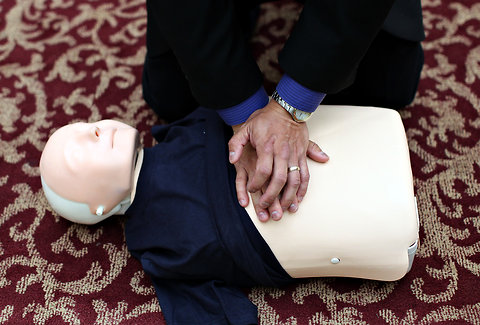How Successful Is CPR in Older Patients?
By Paula Span, The New
York Times
August 9, 2012
World
 Image Credit: Justin Sullivan, Getty Images
Image Credit: Justin Sullivan, Getty Images
What are the
odds of survival for people whose hearts
stop — not in a hospital, but out in the
world — and who receive cardiopulmonary
resuscitation, at least long enough to
get to a hospital and then to be
discharged from it?
Most of us have watched too much
television — one minute the heroic
medical worker pumps the victim’s chest
and grabs the defibrillator paddles and
yells “Clear!,” and in the next scene
the victim is sitting up, chatting with
detectives — to have any realistic idea.
It’s not an easy question to answer
anyway, depending as it does on whether
someone sees the patient collapse or
whether it happens unobserved, on how
long it takes before CPR starts and then
how long before skilled medical
personnel can begin the rest of the
advanced cardiac drill (drugs,
defibrillation, airways). The particular
type of cardiac arrhythmia involved
matters; so do other illnesses the
patient may have, and how frail she is.
But as a ballpark figure, let’s say that
maintaining a heart rate by chest
compression until the cavalry arrives
succeeds no more than 20 percent of the
time. That estimate comes from Dr. David
John, an emergency room doctor in
Massachusetts and Connecticut for 20
years and the former geriatrics chairman
of the American College of Emergency
Physicians. Some studies put the
proportion much lower, some higher.
If we’re surprised, let me add that
referring to TV shows was no joke. In
1996, The New England Journal of
Medicine published an analysis of three
popular series: “ER,” “Chicago Hope” and
“Rescue 911.” Two-thirds of those
victims survived to discharge after CPR,
possibly because in Teeveeland, cardiac
arrests occur most often in children,
teenagers and young adults wounded by
gunshots or injured in auto crashes. In
reality, most people whose hearts stop
are elderly people with cardiac disease.
And for old people in the real world,
the odds of successful CPR seem worse —
though not as much worse as one might
think. One study following about 2,600
out-of-hospital cardiac arrests over
four and a half years in Oakland County,
Mich., found that patients in their 40s
and 50s had the highest rate of
successful resuscitation: 10 percent.
The statistics got only slightly worse
with each decade: 8.1 percent successful
resuscitation for patients in their 60s,
7.1 percent in their 70s. After 80,
though, only 3.3 percent survived to
hospital discharge.
In King County, Wash., where a
surveillance system tracks every
out-of-hospital cardiac arrest,
University of Washington researchers
focused on the very elderly and found
that 9.4 percent of octogenarians and
4.4 percent of nonagenarians survived
after CPR, compared with 19.4 percent of
younger patients. All three groups did
much better if they had the heart
arrhythmias known as ventricular
fibrillation or ventricular tachycardia,
but those occurred more commonly in
younger people, so survival among those
in their 80s and 90s improved to only 24
percent and 17 percent, respectively.
(This study included CPR done by
bystanders, paramedics or both, which
might have affected the results.)
The authors of these and other studies
take pains to say that age alone is not
a basis for doing CPR or withholding it.
You could be the diabetic 53-year-old
who dies or the (rarer) robust
83-year-old with the “right” heart
arrhythmia who pulls through. Moreover,
the wider distribution of automated
external defibrillators in airports and
malls and the ubiquity of cellphones —
both can mean less time between collapse
and help — may have improved results
since these studies were done.
But since older people are much more
likely to have other diseases and health
problems — and since merely getting
discharged from the hospital doesn’t
tell us much about what your subsequent
life is like (can you speak? walk?
remember?) or where you live it or for
how long — I think CPR raises a dilemma
for older adults.
CPR doesn’t work very often, and it
works slightly less often on those
beyond 70 and considerably less often at
more advanced ages. Do you agree to it,
for yourself or your relative? Call 911
and let the emergency technicians, the
people most commonly performing CPR and
defibrillation these days, do their
best? Or do you say no?
It’s such a deeply personal decision
that it’s not surprising that even those
on the front lines of emergency medicine
can come down differently. Tomorrow,
I’ll pass along what a couple of very
seasoned ER doctors had to say, and what
we decided in my own family.
|



